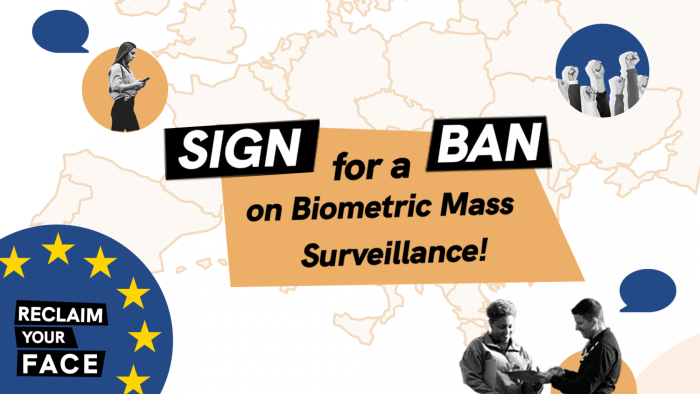Ban biometric mass surveillance
We, with over 40 other organisations, are asking the European Union to ban mass biometric surveillance. If you’re a European Union citizen, join us in signing our European Citizen’s Initiative.
If 1 million of us step up - we can force the European Commission to take on biometric mass surveillance properly
Facial recognition, and other forms of biometric mass surveillance, can feel like futuristic problems - more likely to be seen in a film than in our day to day lives. But that’s no longer true. From Brazil, to Italy, to Uganda, facial recognition is becoming a serious part of our every day lives.
We have a chance to make a difference. We, with over 40 other organisations, are asking the European Union to ban mass biometric surveillance. If you’re a European Union citizen, join us in signing our European Citizen’s Initiative.
If 1 million of us step up - we can force the European Commission to take on biometric mass surveillance properly.
What is a European Citizen's Initiative (ECI)?
A European Citizen's Initiative is a legal tool which allows citizens of the European Union to ask the European Commission directly to start the legistlative process on a particular issue. If that ECI gets 1million or more signatures from at least a quarter of EU countries than it sets in motion a series of events.
Within 1 month
We’ll meet with representatives of the Commission so we can explain why the EU should ban biometric mass surveillance in detail.
Within 3 months
We’ll be able to to present your initiative at a public hearing at the European Parliament. Parliament may also hold a debate in a full (plenary) session, which could lead to it adopting a resolution on banning biometric mass surveillance.
Within 6 months
The Commission will spell out what action it will propose in response to your initiative (if any), and its reasons for taking (or not taking) action.This response will be in the form of a communication formally adopted by the Commissioners and published in all official EU languages.
Unlike a petition, if we hit the threshold these follow ups are writted in to law. We have a huge opportunity to directly ack the EU to take a stand on this issue - but only if we hit that threshold!
Who can sign a European Citizen's Initiative?
Most Citizens of the EU
This ECI is open to all EU citizens, even if you currently live outside the EU (unless you are a German citizen - in which case, see below).
German Citizens living outside the EU
It is possible to sign our ECI petition if you live outside the EU, but German rules mean that for German citizens specifically, your signature will only be valid if you are registered with your current permanent residence at the relevant German diplomatic representation. If you are not registered, then unfortunately your signature will not be counted. You can see more information about the rules here. This rule does not apply to citizens of any other EU country.
Non-European Union Citizen
Unfortunately if you are not an EU national, the EU's official rules say that you cannot sign.
But you can still help by sharing the petition on Twitter, Facebook, Whatsapp or any other way you know how!
Why should I sign?
The use of biometric mass surveillance, including facial recognition, by both police and private actors has a seismic impact on the way our society is monitored or policed. The roll out of such intrusive technology does not only pose significant privacy and data protection questions, but also ethical questions around whether modern democracies should ever permit its use.
For example, the radical introduction of faciial recognition, will inevitably result in the normalisation of surveillance across all societal levels and accordingly cast a "chilling effect" on the exercise of fundamental rights, such as our freedom of expression or our right to protest.
PI is deeply concerned that the use of biometric mass surveillance by both private companies and the police raises significant problems for our individual freedoms. The intrusiveness of such surveillance and the dangers associated with its potential abuse by the police call for robust safeguards and oversight governing its authorisation and use.
